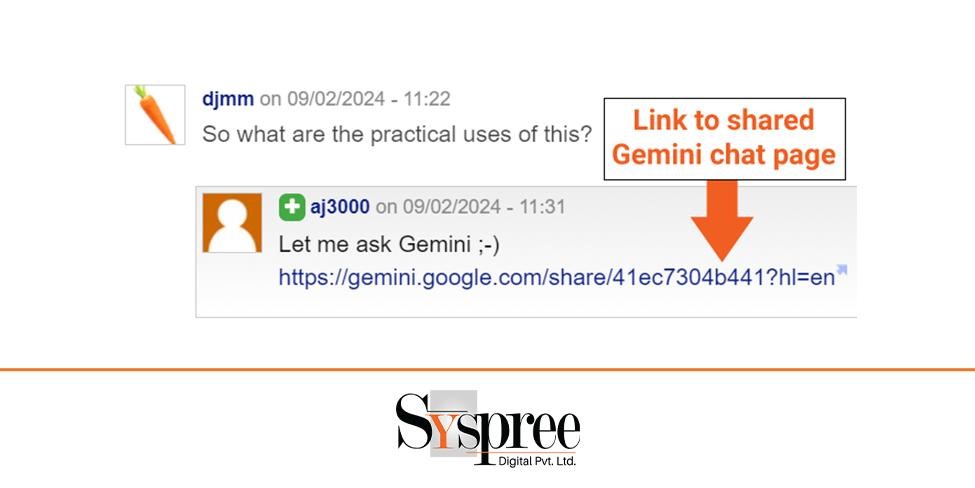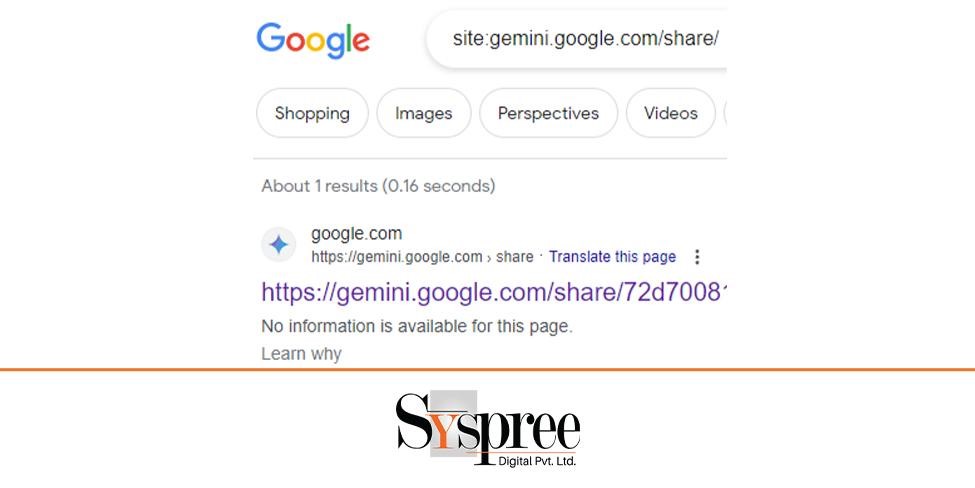The news from the Google Gemini chat data leak created shockwaves across the internet, triggering a flood of reactions and comments. Just days after the initial public launch on Google’s Gemini platform, the incident exposed an unsettling vulnerability. Online discussions and tweets immediately highlighted the issue, and users expressed concerns over disclosing private conversations to a publicly accessible platform.
Initial Reactions and Observations
What appeared at first to be an oversight or a breach on the part of Google revealed an entirely different reality on an investigation. Users found that chat pages were indexed by search engines, such as Bing and Google, resulting in the pages being indexed in error in search results. Even though there was a robots.txt file to manage the crawler’s activity, Google’s refusal to enforce this measure for the Gemini subdomain facilitated search engines to index the site’s content openly.
When the news broke, there were questions about creating and indexing Gemini Chat pages. Users were surprised that they could create a public-facing version of their private conversations with an easy link. This information sheds an understanding of the complexities of privacy online and the potential implications of sharing sensitive data within online spaces.
Amid all the confusion, insights regarding the behavior of search engines such as Google and Bing emerged, revealing different ways of indexing. While Google quickly reacted to the situation by decreasing the visibility of its indexed chat pages, Bing’s response differed and exacerbated the issue.
How Did Gemini Chat Pages Get Created?

Google Gemini Chat Data Leak – How Did Gemini Chat Pages Get Created
Creating shared chat pages in the Google Gemini platform is relatively simple. Still, it is crucial to understand how this Google Gemini chat data leak was discovered. Users, whether deliberately or not, can make publicly visible versions of their private chats using the simple mechanism of link sharing.
Exploring the Process of Creating Shared Chat Pages
The leading SEO company in Mumbai say that upon initiating a conversation in Gemini, users can move to the bottom of the window once they have started a conversation within the Gemini user interface. There, they will see an option that is labeled “Share.” This feature lets users create a unique URL, allowing them access to their conversation with anyone who is shared. Although this feature is designed to allow seamless communication and collaboration, it could open up the possibility of privacy issues when shared rashly or without proper thought.
Screenshot Demonstration
To show the process visually, we offer an example of a screenshot that shows the steps required to create the shared chat page in Google Gemini. In the video, viewers can spot the “Share” button within the chat interface as well as the generation of a shareable hyperlink. This visual aid provides clarity and understanding of how people can accidentally reveal their private conversations on the public web.
The unintended effects of this feature were revealed after the revelation of a Google Gemini chat data leak. Although the chats are supposedly private conversations occurring on Gemini, the capacity to publish chat pages puts users at risk of security risks. The experts from the leading SEO company in Mumbai say without robust security measures or a user’s awareness of the consequences of sharing chat URLs, the possibility of accidental exposure was extremely high.
Why Did Gemini Chat Pages Get Indexed?

Google Gemini Chat Data Leak – Why Did Gemini Chat Pages Get Indexed
Interestingly, even though there is no robots.txt document, the indexing process of Google Gemini chat pages has raised concerns about the mechanisms behind it and the implications for crawling and indexing, and analyzing chat-related content. While robots.txt files function as an established protocol to control crawler activity on web pages, their absence from the Gemini subdomain enabled crawlers to browse and index the chat pages.
Understanding the Absence of a Robots.txt File
One reason why there aren’t robots.txt files in the Gemini subdomain could be due to oversight or oversight by Google’s engineering and development teams. The best SEO company says with the speed of development and deployment in the technology industry, it’s common for certain configurations or settings, like robots.txt files, to be ignored or not included in the initial launch of the new feature or platform.
Implications of Crawling and Indexing Private Chat Content
The consequences that search engines can face in private chats are more than just technical oversight and encompass more general concerns about the privacy of users as well as data security. Although Google Gemini is intended to enable smooth communication and collaboration between users, the unintentional publication of private conversations to search results can pose substantial risks to users’ privacy and security.
This indexing process of Gemini chat pages reveals the inherent tension between the advantages of online collaboration and the necessity to safeguard sensitive data from unauthorized accessibility or divulgation. The experts from the best SEO company say as more and more people rely on digital platforms to communicate and share information, platform developers and providers must prioritize strong privacy safeguards and security precautions to protect users personal information.
In addition, indexing private chat messages emphasizes the need for more awareness and education for users on the dangers of sharing private information online. In recognizing the dangers of public broadcasting of private conversations, users can take preventive steps to safeguard their privacy while reducing the possibility of accidental data leaks or data breaches.
Why Did Chat Pages Begin Dropping Out Of Search Results?
The leading digital marketing company in Mumbai say the abrupt removal of Google Gemini chat pages from search results resulted in confusion and speculation about the rules governing crawlers’ behavior in search results and possible explanations for the drop in the number of chat pages indexed. One possible explanation could be the application of internal rules implemented by algorithms for search engines as a response to the Google Gemini chat data leak.
Search engines such as Google and Bing utilize complex algorithms to determine what websites are shown in the search results. These algorithms consider several factors: relevancy, quality, and user experience. In the instance of the Google Gemini chat data leak, It is possible that the algorithms used by search engines were changed to lower the priority or remove chat sites that are indexed from search results in a proactive approach to solving privacy issues.
Speculations on Internal Rules Affecting Search Crawler Behavior
The internal rules that govern crawlers’ behavior in search can be modified to exclude certain directories and subdomains of the Gemini platform. By identifying and excluding URLs associated with chat pages (e.g., gemini.google.com/share/), search engines could prevent further indexing of potentially sensitive content and minimize the risk of further privacy breaches. This decision aligns with efforts to protect users’ privacy and ensure the integrity of search results.
Potential Reasons for the Decline in Indexed Chat Pages
Another cause for the decrease in chat pages is the perceived relevance or quality of the content. Search engines favor high-quality, relevant content that aligns with user expectations and contains useful information. Due to the nature of private chats on Gemini Chat pages, the search engine could have concluded that the pages didn’t meet the requirements for quality to be included in the results. In the end, they could have relegated or eliminated these pages to ensure the quality and relevancy of the results.
Insights Into How Bing and Google Search Index Content
Understanding how search engines like Bing and Google index content provide valuable insight into the respective responses and approaches to the Google Gemini data leak. Comparing their indexing methods will shed light on their different algorithms and protocols.
Comparative Analysis of Bing and Google Indexing Approaches
Google is the search engine market leader and uses sophisticated algorithms to prioritize quality, relevance, and user experience. The indexing process includes crawling millions of web pages and analyzing their content. Pages are then ranked based on keywords, user engagement metrics, and links. Google’s focus on accurate and valuable results has made it a favorite of millions of users worldwide.
Bing, Microsoft’s search engine, uses a slightly different but similar approach to indexing the content. Bing’s algorithm may also prioritize relevance and quality, but they weigh certain factors differently from Google’s. Bing may also be impacted by its smaller user base and market share compared to Google.
Assessing Search Engine Responses to Gemini Content
The experts from the leading digital marketing company in Mumbai say that in response to the Google Gemini chat data leak, both search engines displayed distinct behaviors in indexing Gemini-related content. Bing responded differently than Google, which took immediate action to reduce chat page visibility in search results. Bing’s algorithms and criteria may have been used to determine Gemini’s visibility, leading to differences in the number of chat pages and their prominence compared to Google.
The search engine responses to Gemini also highlight the importance of online platforms to user privacy and security. Google and Bing have committed to privacy by adjusting their indexing algorithms and protocols.
Why Did Gemini Chat Pages Leak?

Google Gemini Chat Data Leak – Why Did Gemini Chat Pages Leak
Google Gemini’s chat data leak sparked much speculation and debate in the online community. This led to a closer look at the facts and possible reasons behind the incident.
Examination of Known Facts Surrounding the Incident
A few key facts can explain the facts surrounding the Gemini data leak. Google Gemini users could create public versions of private conversations by sharing a link. This feature was intended to promote collaboration and communication. However, it exposed private conversations unintentionally.
The absence of a robots.txt on the Gemini domain allowed search engines such as Google and Bing to crawl and index the chat pages. This further exacerbated the problem. Google implemented a robots.txt, but the damage was already done. Indexed chat pages continued appearing in search results.
Analysis of Potential Reasons for the Disappearance of Indexed pages
The removal of chat pages indexed in search results has raised questions about the reasons behind their removal. Search engine algorithms may have implemented internal rules to mitigate the spread of sensitive content and address privacy concerns. By adjusting the crawling and indexing protocol, search engines could have prioritized or excluded chat rooms from their search results. This would protect user privacy and data security.
The perceived quality or relevance could also be a factor in the disappearance. Search engines may have decided that the Gemini chat pages were not suitable for inclusion in the search results due to the nature of their private conversations. They may have then de-prioritized these pages or removed them to maintain the quality and relevance of their search results.
Lessons Learned from the Google Gemini Chat Data Leak

Google Gemini Chat Data Leak – Lessons Learned from the Google Gemini Chat Data Leak
The Google Gemini chat data leak has caused a lot of reflection. It sheds light on important lessons to be learned to enhance user trust and data privacy on online communication platforms.
Reflection on the Implications of the Gemini Chat Data Leak Incident
First, this incident highlights the vulnerability of digital platforms in terms of privacy breaches. It also emphasizes the need for robust measures to ensure security. The accidental exposure of private Gemini conversations serves as a reminder of the risks of sharing sensitive information online.
Analysis of the Impact on User Trust and Data Privacy in Online Communication Platforms
The incident has also undoubtedly undermined users’ trust in online communication platforms. Users expect that their private communications will remain confidential. Any breach of this trust could have serious consequences. Platforms must prioritize data privacy while implementing stringent security measures to maintain user trust.
Strategies for Improving Data Security and Privacy Measures in Similar Digital Platforms
Platforms can implement several strategies to enhance data security and privacy. Encrypting conversations from end to end, for example, will ensure that they remain secure and unreadable by unauthorized parties. Platforms should also give users greater control over their data. This includes the ability to manage permissions or revoke shared content.
In addition, it is essential to continuously monitor and audit platform security to identify potential vulnerabilities and deal with them proactively. Regular security patches and updates can reduce the risk of data breaches and make platforms more resilient to emerging threats.
Conclusion
The Google Gemini chat data leak is a reminder of the importance of data privacy and security. Platforms must implement robust measures and give users control over sensitive information when communicating online. If you like this blog check out our previous blog Google on Search Console Validation Fix and 404 Errors








The news of the Google Gemini chat data leak has indeed sent shockwaves across the internet, raising significant concerns about privacy and data security. The incident, which exposed private conversations to public access, underscores the complexities of privacy online and the need for stronger safeguards.
The discovery that chat pages were being indexed by search engines, despite efforts to manage crawler activity through robots.txt, highlights a critical oversight. While the intention behind the “Share” feature in Gemini was to facilitate communication and collaboration, it inadvertently created a vulnerability that allowed for the public sharing of private conversations.
The response from search engines, particularly Google and Bing, differed in addressing the issue. Google took immediate steps to decrease the visibility of indexed chat pages, while Bing’s response was less proactive, exacerbating the problem.
In conclusion, the Google Gemini chat data leak serves as a stark reminder of the need for vigilance in safeguarding data privacy and security in online communication platforms.
Wow, didn’t know about this! Thanks for the heads-up
The revelation of the Google Gemini chat data leak underscores the critical importance of data privacy and security in online communication platforms. This incident has sparked significant discussion and reflection on the vulnerabilities inherent in digital platforms, particularly in terms of unintentional exposure of private conversations.
The detailed analysis provided in this blog offers valuable insights into the mechanics behind the incident, shedding light on how Gemini chat pages were created, indexed, and subsequently removed from search results. By exploring the processes involved and potential reasons for the leak, the blog provides a comprehensive understanding of the situation.
Moreover, the blog delves into the responses of search engines like Google and Bing, highlighting the differences in their approaches to indexing and addressing privacy concerns. This comparative analysis offers a nuanced perspective on the role of search engine algorithms in safeguarding user privacy.
The lessons learned section aptly summarizes the key takeaways from the incident, emphasizing the need for robust data security measures, user trust, and proactive strategies to prevent similar breaches in the future. By reflecting on the implications of the Gemini chat data leak, the blog encourages stakeholders to prioritize data privacy and implement stringent security measures in digital platforms.
Overall, this blog serves as a valuable resource for understanding the complexities of data privacy and security in online communication platforms. Its thorough analysis and insightful commentary contribute to the ongoing dialogue surrounding data protection and user trust in the digital age.
A very interesting, valuable and insightful blog. Prioritizing privacy and strict security measures is important across the internet.